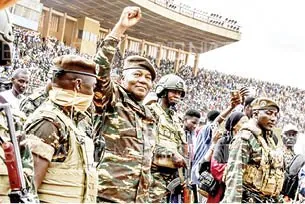Niger’s military regime is organising a “national convention” from today, February 15 to 19, notably intended to set the duration of the transition period that began with the 2023 overthrow of civilian President Mohamed Bazoum.
The interior ministry had unveiled the dates in a press release broadcast last Saturday on state television, adding that the gathering would take place in the capital, Niamey.
Join Our WhatsApp Channel
To join: Simply click on the link below and turn on notifications to receive the latest scholarship, job, and opportunity updates instantly.
Join WhatsApp ChannelNiger is one of several countries in Africa’s Sahel region where the military has seized power in coups in recent years, amid persistent attacks by jihadist insurgencies.
The convention is seen as a step towards returning to democratic rule and stability in the region. In August 2023, shortly after taking power in a coup, General Abdourahamane Tchiani announced the organisation of an “inclusive national dialogue” to outline the priority areas of governance and lay down the duration of the transition to a democratically elected government.
At the time, he mentioned a maximum duration of three years but gave no details of the plan, noting that only the principles for the transition would be decided within 30 days at a dialogue to be hosted by the junta.
“Our ambition is not to confiscate power. Transition period will not exceed three years. Meanwhile, political parties are urged to submit their vision for the transition within 30 days,” Tiani had said.
While the Economic Community of West African States (ECOWAS) had condemned the coup and threatened military intervention, it is likely to view the convention as a step towards resolving the political crisis.
It had, in 2023, rejected the three-year power transition plan proposed by Niger Republic’s military junta.
Abdel-Fatau Musah, ECOWAS commissioner for political affairs, peace and security, while speaking with the British Broadcasting Corporation (BBC), said the regional body would no longer accept prolonged transition periods.
“ECOWAS is not accepting any prolonged transition again in the region. They just have to get ready to hand over in the shortest possible time.
“The earlier they give power back to civilians and concentrate on their primary responsibility, that is defending the territorial integrity of Niger, the better for them,” he had said.
However, Niger, alongside Mali and Burkina Faso, have since left the regional bloc in January after accusing it of protecting the interest of Western powers and not doing much to help tackle their security problems. ECOWAS had earlier sanctioned Niger after the unconstitutional change of government in the country.
Meanwhile, early last year, consultations were held across the country’s eight regions to lay out a working basis for the meetings, with a national commission also created by presidential decree to oversee the work of the four-day conference set to produce a “preliminary draft of the transition charter.”
Following the gathering, there will be a three-week period to draft a “final report” that will be sent to General Tiani.
According to the plan, the National Commission overseeing the National Convention on the Transition Charter, headed by Dr Mamoudou Harouna Djingareye, a traditional leader, consists of approximately 50 members. These members were carefully selected to represent a wide range of stakeholders, including former ministers, academics, lawyers, soldiers, advisors to General Tchiani, religious leaders and civil society figures.
It is made up of five sub-committees, which include Peace, Security, National Reconciliation, and Social Cohesion. The committees will address issues related to maintaining peace and security, fostering national reconciliation and promoting social cohesion within the country.
Another sub-committee, Political and Institutional Overhaul, will focus on reforms needed to overhaul the political and institutional structures to ensure a more stable and democratic governance framework.
Also, there is the Justice and Human Rights sub-committee, which will work on ensuring that justice and human rights are upheld during the transition period and beyond. Though there has been wide scepticism about the intention of the military junta to truly return the country to the path of democracy, the head of Niger’s military regime has emphasised that the convention would be inclusive and aims to set governance priorities and determine the transition timeline.
Ibrahim Faruk, a programme coordinator for the African division at Yiaga Africa, viewed the convention as a positive step towards returning to democratic rule. He said that democratic stability in Niger could have a ripple effect in the West African sub-region, promoting development and stability.
“This signals the beginning of the timeline for a transition to a democratically elected government in the Republic of Niger. I think why this is important is that democratic stability in the West African sub-region has a way of creating a ripple effect. We saw how, once there were coups and attempted coups in some of these countries, it caused a ripple effect. But beyond just a return to a democratic government, it must also provide the promise of development that comes with democracy as well.
“I hope that this step in the Republic of Niger would signal to their brothers in Mali and Burkina Faso that indeed there’s an importance to return to democratically elected government,” Faruk said.
Mali and Burkina Faso have extended their transition timelines despite initially pledging a quicker return to democracy.
Ahmed Buhari, a political analyst, viewed the convention as a positive step, but emphasised the need for tailored solutions. He said, “It is very important for us Africans to know that we cannot copy and paste an entire system and expect it to work with different cultural views, values and norms. We must create a democratic environment that is suitable for our current realities and challenges.”
Similarly, a civil society leader, Mahmoud Mamadou, believes the convention represented an opportunity for inclusive dialogue and national unity.
“This convention is a chance for all Nigeriens to come together, share their perspectives and build a stronger, more democratic nation,” he said.
However, a former minister, Adama Soumaila, highlighted the importance of adherence to transition timelines, saying, “Mali, Niger and Burkina Faso have witnessed unconstitutional change of government. It is crucial that Niger sets an example by adhering to the agreed transition timeline and returning to democratic governance.”
On his part, Amadou Issoufou, a human rights activist, stressed the need for transparency and accountability, saying, “The success of this convention will depend on the transparency of the process and the accountability of those involved. The people of Niger deserve to know that their voices are being heard and respected.”
Many regional and international observers, including representatives from the African Union and the United Nations, are cautiously optimistic about the convention. They emphasise the importance of a peaceful and inclusive transition process to ensure a long-term stability in Niger and the broader Sahel region.
Overall, there is a sense of cautious optimism that the convention would pave the way for a peaceful and democratic transition in Niger.


